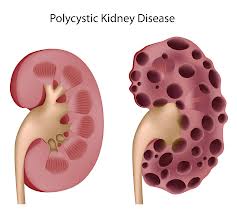Polycystic kidney disease (PKD) is a disorder in which clusters of cysts develop primarily within your kidneys. Cysts are noncancerous round sacs containing water-like fluid.
When PKD causes kidneys to fail-which usually happens after many years-the patient requires dialysis or kidney transplantation. About one-half of people with the most common type of PKD progress to kidney failure, also called end-stage renal disease (ESRD).
PKD can also cause cysts in the liver and problems in other organs, such as blood vessels in the brain and heart. The number of cysts as well as the complications they cause help doctors distinguish PKD from the usually harmless “simple” cysts that often form in the kidneys in later years of life.
In the United States, about 600,000 people have PKD, and cystic disease is the fourth leading cause of kidney failure. Two major inherited forms of PKD exist:
Autosomal dominant PKD is the most common inherited form. Symptoms usually develop between the ages of 30 and 40, but they can begin earlier, even in childhood. About 90 percent of all PKD cases are autosomal dominant PKD.
Autosomal recessive PKD is a rare inherited form. Symptoms of autosomal recessive PKD begin in the earliest months of life, even in the womb.

